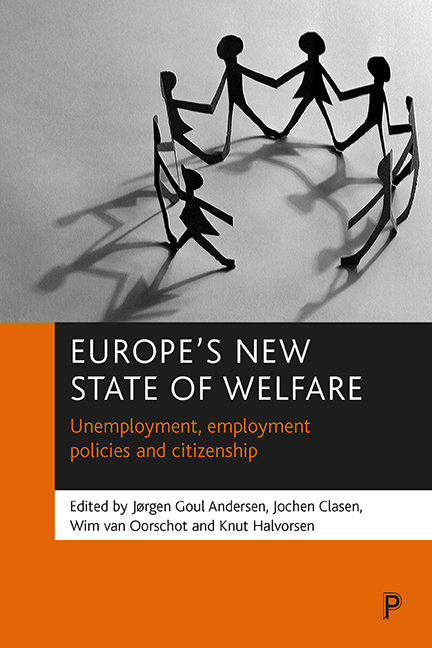Book contents
- Frontmatter
- Contents
- Notes on contributors
- Glossary
- Preface
- one Changing labour markets, unemployment and unemployment policies in a citizenship perspective
- two Employment and unemployment in Europe: overview and new trends
- three Unemployment and unemployment policy in the UK: increasing employability and redefining citizenship
- four To be or not to be employed? Unemployment in a ‘work society’
- five France: the impossible new social compromise?
- six Labour market participation in the Netherlands: trends, policies and outcomes
- seven Is high unemployment due to welfare state protection? Lessons from the Swedish experience
- eight Denmark: from the edge of the abyss to a sustainable welfare state
- nine Unemployment and (un)employment policies in Norway: the case of an affluent but oil-dependent economy: the paradox of plenty?
- ten Unemployment and unemployment policy in Finland
- eleven Slovenia’s navigation through a turbulent transition
- twelve Unemployment and unemployment policy in Switzerland
- thirteen Work, welfare and citizenship: diversity and variation within European (un)employment policy
- References
- Index
- Also available from The Policy Press
thirteen - Work, welfare and citizenship: diversity and variation within European (un)employment policy
Published online by Cambridge University Press: 20 January 2022
- Frontmatter
- Contents
- Notes on contributors
- Glossary
- Preface
- one Changing labour markets, unemployment and unemployment policies in a citizenship perspective
- two Employment and unemployment in Europe: overview and new trends
- three Unemployment and unemployment policy in the UK: increasing employability and redefining citizenship
- four To be or not to be employed? Unemployment in a ‘work society’
- five France: the impossible new social compromise?
- six Labour market participation in the Netherlands: trends, policies and outcomes
- seven Is high unemployment due to welfare state protection? Lessons from the Swedish experience
- eight Denmark: from the edge of the abyss to a sustainable welfare state
- nine Unemployment and (un)employment policies in Norway: the case of an affluent but oil-dependent economy: the paradox of plenty?
- ten Unemployment and unemployment policy in Finland
- eleven Slovenia’s navigation through a turbulent transition
- twelve Unemployment and unemployment policy in Switzerland
- thirteen Work, welfare and citizenship: diversity and variation within European (un)employment policy
- References
- Index
- Also available from The Policy Press
Summary
Not so long ago mass unemployment seemed to be a universal and typically European problem. From the early 1980s onwards most Western-European countries were plagued by unemployment figures that permanently and by far exceeded those of other industrialised countries, notably the US. Early socioeconomic policies, that tried to stimulate domestic demand, increase international economic competitiveness and redistribute labour, had no clear and lasting positive effects. The idea then took hold that unemployment in Europe was a structural phenomenon strongly connected to the relatively generous welfare systems of European countries and their rigid labour market institutions. This image of ‘Eurosclerosis’ – of European welfare states being caught in structures of inflexibility, preventing the solution of the problem of mass unemployment – contrasted sharply with the image of the liberal US welfare state, where flexible labour markets and low social protection fuelled the jobs machines of its service economy. In more detail, the standard interpretation of the European problem of structural unemployment saw two main causes: the gap between wages and productivity for low-skilled workers, and the inflexibility of and distortions to the smooth functioning of labour markets. Solutions advocated broadly in national and international policy discourses included increasing wage flexibility; increasing productivity levels and employability of workers; flexibilisation of labour contracts and working-time; and changing incentive structures for employers (subsidies, tax credits), but of course also for the unemployed (lower and shorter benefits, stricter work tests, workfare type obligations). At present ideas and dialogues of this kind, based on the standard interpretation of the unemployment problem and asking for a shift from equality and protection to employment, still dominate the work and welfare policy nexus.
However, as Chapters One and Two have illustrated, actual developments in European employment and unemployment rates since the second half of the 1990s defy the pessimistic Eurosclerosis image of structural mass unemployment. In recent years many European countries have experienced a decisive decline in unemployment, notably Denmark, the Netherlands, Portugal, Ireland, Austria, Sweden and the UK. In fact, these countries of the EU15 outnumber those with still high and persistent unemployment, for example Germany, France, Italy, Finland and Spain, which means that the standard interpretation has no universal empirical validity.
- Type
- Chapter
- Information
- Europe's New State of WelfareUnemployment, Employment Policies and Citizenship, pp. 233 - 246Publisher: Bristol University PressPrint publication year: 2002
- 1
- Cited by



